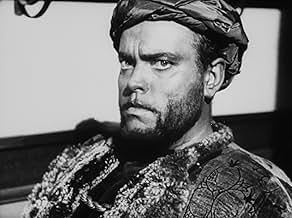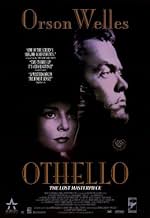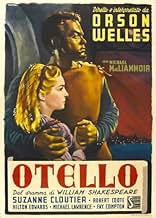PUNTUACIÓN EN IMDb
7,5/10
9,9 mil
TU PUNTUACIÓN
Un general moro es manipulado para albergar la idea de que su esposa le es infiel.Un general moro es manipulado para albergar la idea de que su esposa le es infiel.Un general moro es manipulado para albergar la idea de que su esposa le es infiel.
- Dirección
- Guión
- Reparto principal
- Premios
- 1 premio y 1 nominación en total
Abdullah Ben Mohamet
- Pageboy
- (sin acreditar)
Joseph Cotten
- Senator
- (sin acreditar)
Jean Davis
- Montano
- (sin acreditar)
Joan Fontaine
- Page
- (sin acreditar)
Robert Rietty
- Lodovico
- (voz)
- (sin acreditar)
Gudrun Ure
- Desdemona
- (voz)
- (sin acreditar)
Reseñas destacadas
Othello, Moor of Venice, loves Desdemonda. Unbeknownst to him, one of his lieutenants, Iago, seething with jealousy, plans to bring him down. Iago slowly builds a web of deceit and lies around Othello that leads him to question the faithfulness of his wife and men, ultimately pushing him to far...
Many a time has a white actor portrayed black Othello. Thankfully, Welles excels in the title role, his hurt palpable. In adapting Shakespeare's play, Welles has done away with subplots he deemed unnecessary. His "Othello" boils down to the title character, his wife, Iago and bit players (and impressive numbers of extras). Fans of the text may regret the absence of a character or the significant reduction of his/her importance. It diminishes the play but enhances the film, giving it a tighter focus and a more fluid structure and running time. But as always, we expect more from an Orson Welles film.
Orson Welles is mostly celebrated for reinventing the look of film. His pictures each possess a unique aesthetic and daring camera work. Othello holds its own even when measured against the impressive Welles oeuvre, a true miracle if you are familiar with the films' history. Shooting it over years and in different locations (Morocco, Spain, etc.) with variations, often within the same scene, Welles managed to create the watertight illusion of a coherent world, leading the viewer to imagine that lavish sets and locations were available. For anyone interested in editing or any other aspect of film-making, this is an indisputable milestone in directorial resourcefulness.
Othello was Welles's second Shakespeare interpretation as star and director, soaring high above his very interesting Macbeth. He would return to the Bard one last time with his apotheosis, Chimes at Midnight. This trilogy is a gift. What a joy it is to see America's greatest director work with the world's greatest playwright...
Many a time has a white actor portrayed black Othello. Thankfully, Welles excels in the title role, his hurt palpable. In adapting Shakespeare's play, Welles has done away with subplots he deemed unnecessary. His "Othello" boils down to the title character, his wife, Iago and bit players (and impressive numbers of extras). Fans of the text may regret the absence of a character or the significant reduction of his/her importance. It diminishes the play but enhances the film, giving it a tighter focus and a more fluid structure and running time. But as always, we expect more from an Orson Welles film.
Orson Welles is mostly celebrated for reinventing the look of film. His pictures each possess a unique aesthetic and daring camera work. Othello holds its own even when measured against the impressive Welles oeuvre, a true miracle if you are familiar with the films' history. Shooting it over years and in different locations (Morocco, Spain, etc.) with variations, often within the same scene, Welles managed to create the watertight illusion of a coherent world, leading the viewer to imagine that lavish sets and locations were available. For anyone interested in editing or any other aspect of film-making, this is an indisputable milestone in directorial resourcefulness.
Othello was Welles's second Shakespeare interpretation as star and director, soaring high above his very interesting Macbeth. He would return to the Bard one last time with his apotheosis, Chimes at Midnight. This trilogy is a gift. What a joy it is to see America's greatest director work with the world's greatest playwright...
10EddieK
Considerable controversy has surrounded the 1992 restoration and re-release of Orson Welles' "Othello." First, the film was wrongly labelled a "lost classic" - not technically true, as Welles aficionados will realize. More seriously, the restoration crew (under the aegis of Welles' daughter, Beatrice Welles) re-synced the dialogue and re-recorded the musical score - an abomination to Welles purists. While it would have been preferable to adhere to Welles' vision for the film, such an endeavor becomes extremely difficult when no written record of Welles' intent exists (as it did with his famous 26-page memo to Universal regarding "Touch of Evil"). So it's true that the restored version lacks a degree of authenticity, but what are the alternatives? Grainy, scratched, poorly synced public domain prints (c.f. "Mr Arkadin" and "The Trial")? Or, worse, no available copy at all (c.f. "Chimes at Midnight")?
Anyway, on to the film. "Othello's" existence helps disprove the charges of profligacy and "fear of completion" that plagued Welles' career after "Citizen Kane." Shot over four years in Morocco and Italy, and financed largely by Welles himself, "Othello" manages to avoid a low-budget look, thanks largely to virtuoso editing that masks the incongruities of time and space. Welles' powers of invention are on full display here, most obviously in the famous Turkish bath scene (an improvised set necessitated by a lack of costumes). Set designer Alexandre Trauner's astute choice of Moroccan and Venetian locations instantly establishes a geographic authenticity; Welles initially exploits them for all their stark beauty before retreating into noirish interiors, underscoring Othello's descent into darkness.
Aside from Michael Macliammoir's chilling Method performance as Iago, the acting in Welles' "Othello" has been criticized as too restrained and modulated for Shakespearean tragedy. Such criticism is largely unwarranted, for this "Othello" is as much for the eyes as the ears: Welles' bold framing and expressionistic camera angles free the play from its theatrical moorings (pun intended), undermining the need for stage elocution. Indeed, the camera is the true star of this film, as Welles generates images that match the grandeur and eloquence of Shakespeare's language.
Anyway, on to the film. "Othello's" existence helps disprove the charges of profligacy and "fear of completion" that plagued Welles' career after "Citizen Kane." Shot over four years in Morocco and Italy, and financed largely by Welles himself, "Othello" manages to avoid a low-budget look, thanks largely to virtuoso editing that masks the incongruities of time and space. Welles' powers of invention are on full display here, most obviously in the famous Turkish bath scene (an improvised set necessitated by a lack of costumes). Set designer Alexandre Trauner's astute choice of Moroccan and Venetian locations instantly establishes a geographic authenticity; Welles initially exploits them for all their stark beauty before retreating into noirish interiors, underscoring Othello's descent into darkness.
Aside from Michael Macliammoir's chilling Method performance as Iago, the acting in Welles' "Othello" has been criticized as too restrained and modulated for Shakespearean tragedy. Such criticism is largely unwarranted, for this "Othello" is as much for the eyes as the ears: Welles' bold framing and expressionistic camera angles free the play from its theatrical moorings (pun intended), undermining the need for stage elocution. Indeed, the camera is the true star of this film, as Welles generates images that match the grandeur and eloquence of Shakespeare's language.
I must be one of the few who saw this film (more than once!) before it vanished in the 60's. I saw it on TV in the last 50's, and later brought it to the small college where I was teaching 63-65. Though heavily cut and more than a little rearranged, it is one of the very finest of Shakespeare films. Performances are generally excellent and unified in style and diction. Welles, or course, is magnificent. Anyone who thinks he was never anything but a self-parodying ham has not seen this film. One could wish than MacLiammoir had had more overt FUN as Iago, who does what he does, in part at least, in an attempt to stimulate himself out of his blunted affect. The film also has some of the finest black-and-white cinematography of all time, and uses architecture in a unique and effective way.
Right from the start, Othello has a striking visual style. Oblique camera angles (from low and high, close and far), nice use of shadows, a cool-looking castle. Really nice black-and-white imagery to look at.
On the other hand, I wasn't as convinced by the story and acting (but they grew on me as the film continued). There are many parts where actors seem to rush or mumble their lines. Shakespeare is hard enough to follow and a good performance should draw you in and make the dialogue *easier* to understand. Characters are often facing away so we hear their lines but can't see their mouths or their facial expressions. What's the point of acting then? I can act if acting means reciting lines from a Shakespearean play.
I have since learned that Welles was struggling with funds for the movie and that explains some of its short-comings. Especially with sound. He had to dub some of the lines himself and there remain parts which are clearly out of sync. It's hilarious to learn that he borrowed/took costumes from another movie to use on Othello. And that costumes weren't ready for one scene so he changed the location to a bathhouse with the actors in towels.
I find the story flawed. Iago is single-handedly able to manipulate Othello to his will. Iago is unlikable because of his misanthropy but Othello may be even more unlikable in his stupidity. He never thinks to properly analyse or question what Iago presents to him as the truth. He barely seems to communicate with his wife at all and becomes consumed by his obsessions and assumptions. But I do somewhat admire Iago's patience and intelligence, he makes a good villain. And there is real tragedy to what happens. It's conceivable that some unfortunate coincidences could help a seed of suspicion grow into the full-hearted conviction that you're being lied to. And to desire revenge is all too human. It's just funny that nobody suspects Iago. Othello would prefer to believe that everyone else is against him.
I found the ending climactic and meaningful. Some of it took me by surprise, other parts felt inevitable. I'm aware that Welles shortened the play a lot and may have taken liberties with it. At least I now have a rough idea of what Othello is about; I feel more educated. I liked all of the actors but Micheál MacLiammóir (a Dublin actor in his only feature film role) stands out as the antagonist. There's something about his eyes and calm indifference. Less is more.
Summarising, Othello is rewarding for its villain, its believable tragic turn of events and the enjoyable, creative cinematography. Now if only Othello could learn the scientific method...
On the other hand, I wasn't as convinced by the story and acting (but they grew on me as the film continued). There are many parts where actors seem to rush or mumble their lines. Shakespeare is hard enough to follow and a good performance should draw you in and make the dialogue *easier* to understand. Characters are often facing away so we hear their lines but can't see their mouths or their facial expressions. What's the point of acting then? I can act if acting means reciting lines from a Shakespearean play.
I have since learned that Welles was struggling with funds for the movie and that explains some of its short-comings. Especially with sound. He had to dub some of the lines himself and there remain parts which are clearly out of sync. It's hilarious to learn that he borrowed/took costumes from another movie to use on Othello. And that costumes weren't ready for one scene so he changed the location to a bathhouse with the actors in towels.
I find the story flawed. Iago is single-handedly able to manipulate Othello to his will. Iago is unlikable because of his misanthropy but Othello may be even more unlikable in his stupidity. He never thinks to properly analyse or question what Iago presents to him as the truth. He barely seems to communicate with his wife at all and becomes consumed by his obsessions and assumptions. But I do somewhat admire Iago's patience and intelligence, he makes a good villain. And there is real tragedy to what happens. It's conceivable that some unfortunate coincidences could help a seed of suspicion grow into the full-hearted conviction that you're being lied to. And to desire revenge is all too human. It's just funny that nobody suspects Iago. Othello would prefer to believe that everyone else is against him.
I found the ending climactic and meaningful. Some of it took me by surprise, other parts felt inevitable. I'm aware that Welles shortened the play a lot and may have taken liberties with it. At least I now have a rough idea of what Othello is about; I feel more educated. I liked all of the actors but Micheál MacLiammóir (a Dublin actor in his only feature film role) stands out as the antagonist. There's something about his eyes and calm indifference. Less is more.
Summarising, Othello is rewarding for its villain, its believable tragic turn of events and the enjoyable, creative cinematography. Now if only Othello could learn the scientific method...
I've always been an admirer of Welles movies, starting with citizen Kane and the other masterpieces. Considering Othello, I highly admired this movie since the first shot, when the face of the dead Othello appears suddenly in the dark, and then the other details begin to appear, revealing the awesome funeral of both Othello and his murdered wife. In fact the best thing about this movie is the synchronization of the camera movement and angles with the state of mind and moods of characters especially that of Othello. Sometimes we are actually looking at the world through Othello's mind, the images are bizarre and grotesque, this is accompanies by wonderful acting of the cast. For any Welles fan this is a must see, considering the beauty of picture and creativity of interpretation. It's a pity that Welles didn't have a sufficient financial support to surpass some technical problems although the final effect and meaning of this masterpiece is not affected at all!
¿Sabías que...?
- CuriosidadesWhen he made La rosa negra (1950), Orson Welles insisted that the coat his character wore be lined with mink, even though the lining would never be visible in the finished film. The producers acquiesced to this demand. When the shoot was over, the coat disappeared. In "Othello", Orson Welles can be seen wearing the same coat, complete with mink lining.
- Versiones alternativasThis film by Orson Welles, was 'restored' by a group in Chicago in 1991/2. The film was transferred to, and enhanced in video, (D1 format) retaining it as black and white. The audio was completely rebuilt, including the score, in Stereo Surround. All dialogue, however was original. This was a problem as some of the dialogue was distorted and unintelligible. John Fogelson, editor, was a major supervisor of the project. Ed Golya, Lorita DeLacerna, and Steve Wilke, were digital editors. And Ed Golya remixed the soundtrack. The process took 9 months. It was purchased for distribution by Castle Hill, and taken to New York where it went through another transformation before release. The restoration engineer in New York, Paul Michael, restored the audio that was supplied on 35mm optical negatives. He was able to remove the distortion, optical pops and surface noise that is inherent with Optical negatives. The restored audio was then sent to Sound One for the final mix. Unintelligible dialogue was replaced with 'sound-alikes'. This decision was made for the entertainment value of the film. The original mono music was then reintroduced into the final product. Basically, the film was retransferred, and the rebuilt sound effects tracks were added. This was done at Sound One, in NYC.. The credits were adjusted to place Lee Dickter (sp?) as Re-recording Mixer, and Ed Golya as Sound Effects Editor.
Selecciones populares
Inicia sesión para calificar y añadir a tu lista para recibir recomendaciones personalizadas
- How long is Othello?Con tecnología de Alexa
Detalles
- Fecha de lanzamiento
- Países de origen
- Sitios oficiales
- Idiomas
- Títulos en diferentes países
- Othello
- Localizaciones del rodaje
- Castle, El Jadida, Morocco(cistern interior)
- Empresas productoras
- Ver más compañías en los créditos en IMDbPro
Taquilla
- Recaudación en Estados Unidos y Canadá
- 28.980 US$
- Fin de semana de estreno en EE. UU. y Canadá
- 6010 US$
- 27 abr 2014
- Recaudación en todo el mundo
- 28.980 US$
- Duración1 hora 30 minutos
- Color
- Relación de aspecto
- 1.37 : 1
Contribuir a esta página
Sugerir un cambio o añadir el contenido que falta

Principal laguna de datos
By what name was Otelo (1951) officially released in India in English?
Responde

































